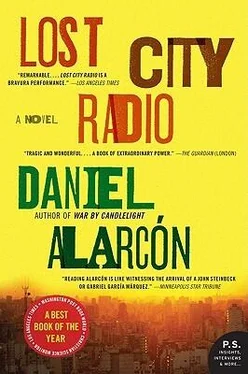In the jungle, where his mistress was preparing to give birth, it was the rainy season: the skies alternating between a deep blue and a dark, purplish black. The river had swelled, as it did every year, flooding the fields at the edge of the village. Rey never liked the rainy season: he found the consistent downpour overwhelming, dreary, in sharp contrast to the rest of the year, when the rain came in spurts, brief and violent showers that passed in the course of half an hour, followed by bright and garish sunlight. Travel, never easy, was nearly impossible during the rainy months. The roads were muddy, and the jungle violently overgrown. He had once spent ten days trying to travel a dozen kilometers between a town and a camp hidden in the forest. The jungle was crawling with secretive men. In the rainy months, it was all too gloomy.
In a city hospital, the boy would have been weighed and washed by white-clad nurses, held and inspected by doctors, showed off by a proud father passing out cigars. 1797 was not the city. It was a place with its own rituals, though, at this late date, with the war having bled the town of its men for more than half a decade, one might say the celebration accompanying Victor’s birth was half-hearted at best. That year, another eight young men had left to fight. Five would not return — another five names on the list Victor would take to the city eleven years later. The town was in no mood for celebrations. In the old days, a feast would have been prepared and a tree felled for a bonfire, but everything had changed, even the blessings: the standard incantation now asked specifically that the child be protected from bullets. It was common among young mothers to observe that their boys were only on loan to them from the armies.
One tradition had remained, in spite of the war, and it was the only one Adela insisted upon when Rey returned to 1797 six months later. He was sent into the jungle for a night, to ponder his child’s future with the aid of a psychoactive root. In its hallucinatory sway, Rey was assured, all kinds of truths would be revealed. He went unwillingly, but felt he owed it to the mother of his child, whom he had mistreated in every other way. He hadn’t been present at Victor’s birth; but then, no one expected this of him. He hadn’t helped choose the boy’s name, hadn’t been there to hold Adela’s hand or take the baby to his chest and feel the infant’s warmth. Rey had promised his father a grandson, but when it finally happened, he was unaware that his promise had been fulfilled. Rey’s father would never know. When Victor was born, Rey was at the radio station in the distant, gray city, half-clothed and asleep in an armchair in the sound booth.
That night, while Victor slept against his mother’s breast, Norma hardly answered the phones. She was content to let the songs do her talking for her, content to watch her husband sleep in the chair across from her. His presence calmed her. Around three in the morning, though, her strength was fading, she’d had her fill of coffee, and she decided to take a few calls, just to help her stay awake. What did she expect? One of the usual suspects: someone lonely or grieving, a man or a woman who found themselves unhappily and unwillingly alone. On a night like this, the radio felt like a public ser vice. She had acquired more than a few admirers in her brief run as Yerevan’s replacement, and she was not immune to pride. What harm could come from flirting now and again with a caller? They told her she was beautiful, or that she sounded beautiful, and was there really a difference? It was the middle of the night, the sound booth still smelled of sex, and she was happy. Norma patched through a few calls, listened with some interest as a woman described the confectionery her grandfather had once owned downtown. “It’s all gone,” the woman said with a sigh. She spoke with unhinged nostalgia, enough for Norma to suspect she’d been drinking. She was afraid to go down there now, the woman told Norma, afraid of what, if anything, had replaced her grandfather’s candy store. What if it was boarded up? What if there were squatters living there — a family of those mountain people?
Norma did not judge, she didn’t stop her. “Be nice,” was all she said. She played a song, then took another call, and was not surprised when a man’s voice announced that he’d been trying to get through all night.
“Well, now you’ve found me,” Norma said. “You’re live on the air. What can I do for you?” She played a jazz record in the background: something with strings and a bluesy trombone.
“You can’t do anything for me,” the man on the other end said. “Shouldn’t Yerevan’s show be on the air now?”
They had all been advised not to say his name on the air. She began to say that Yerevan was away on vacation — this was the line the station was using in emergencies — but something made her stop: the abrupt tone of the caller, perhaps, something in the sound of his voice. She shouldn’t have asked, but she did: “Who’s this?”
“Never mind who this is. The question is, who was Yerevan? An IL dog. That’s why you can find his body in a ditch by the Central Highway. This is what happens to terrorists.”
Before Norma could respond, the line was dead. She sat there for a moment, scarcely breathing. The jazz record stopped, and it was ten seconds before she gathered the presence of mind to play another. She grabbed one at random and put it on with trembling hands. It began too fast: she’d set the wrong speed. A horn squealed, a voice crept unpleasantly into the higher register. Meanwhile, the phone lines were lit up, every last one of them. She stared helplessly at the blinking red lights. Rey didn’t stir until she had called his name for the third time.
“MUSIC ONLY,” Elmer said when Norma called him at home. “Music only until I get there. No phone calls, not on the air or off.”
So she sat with Rey, and they played cheerful pop songs and said nothing. Under different circumstances, he might have sung for her, but instead, they put on one side of a Hollywood record, a musical, and went to the conference room. It was a clear night, just past three in the morning, that hour when the sleeping city seemed like the inside of a dimly glowing machine. They could see, from the radio’s high, broad windows, the coruscating grid of lights below: the Metropole and its blinking neon sign, the strings of orange streetlamps along the avenues, each pointing toward the center of town. From this vantage point, it did not seem an unpleasant place to live — no fire in the hills, no blackout. The shanties, in this light, might not be shanties at all. Norma and Rey could squint and imagine it to be an orderly city, like any of hundreds that exist in the world. They stood together, holding hands, and there was very little that could be said. The Central Highway ran over the mountains in the east — you couldn’t see it from here. Yerevan was somewhere along that road, in a place where he would surely be found.
Elmer arrived within the hour, looking harried and sleepy. “What are you doing here?” he said to Rey, but he didn’t wait for an answer. “It doesn’t matter,” he said and turned to Norma. “Tell me everything.”
Everything was very little. In a sentence or two, it was done: Norma sketched the voice, its dark timber, its tone of menace and violence. This was all. Yerevan, dead. Yerevan, IL. “Is it true?” she asked. “Do you think it’s real?”
Elmer nodded.
Rey watched and listened without a sound. He didn’t like Elmer, this pretend tough guy with a slouch and a paunch. He had the faraway gaze of a gambler who rarely wins, of a man who staggers home to punish his family for his own shortcomings. Rey almost smiled: he was exaggerating. There was no violence in Elmer. Rey could, if he wished, tell this man certain facts. He could tell him about the Moon, for instance, or he could speculate with some accuracy about the nature of Yerevan’s final hours. Nine days before, just after the rumor of Yerevan’s involvement had first surfaced, Rey had met his contact and asked what was being done for “our friend at the radio.”
Читать дальше












